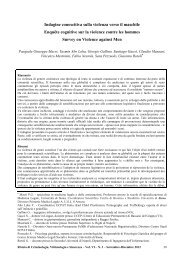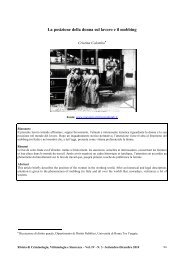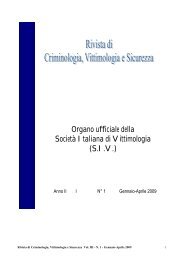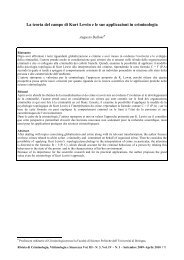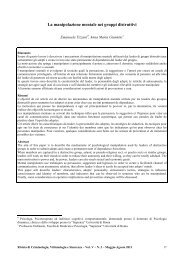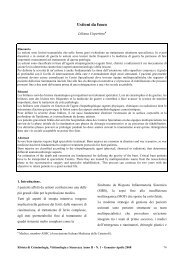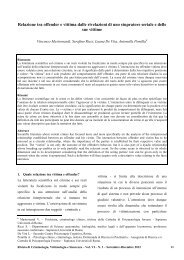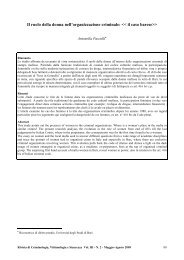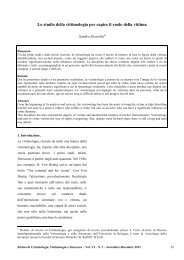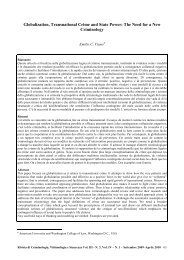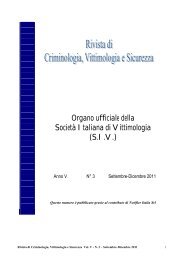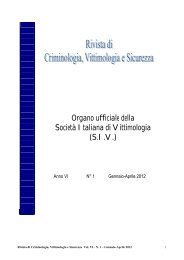Organo ufficiale della Società Italiana di Vittimologia (S.I.V.)
Organo ufficiale della Società Italiana di Vittimologia (S.I.V.)
Organo ufficiale della Società Italiana di Vittimologia (S.I.V.)
Create successful ePaper yourself
Turn your PDF publications into a flip-book with our unique Google optimized e-Paper software.
Le vittime <strong>di</strong> genoci<strong>di</strong>o e i <strong>di</strong>lemmi delle promesse <strong>di</strong> giustiziaNicoletta Policek •RiassuntoQuesto articolo propone una <strong>di</strong>scussione su alcuni degli aspetti che contribuiscono a caratterizzare la definizione <strong>di</strong>vittima del genoci<strong>di</strong>o, suggerendo una sorta <strong>di</strong> sgretolamento dei limiti prettamente giuri<strong>di</strong>ci, in favore <strong>di</strong> unadefinizione <strong>di</strong> vittima <strong>di</strong> genoci<strong>di</strong>o che comprenda tutte le molteplici e a volte contrastanti voci <strong>di</strong> coloro che sonotestimoni <strong>di</strong>retti o in<strong>di</strong>retti del “crimine <strong>di</strong> tutti i crimini”. La definizione <strong>di</strong> vittima dal punto <strong>di</strong> vista delle circostanzeconcrete è a volte <strong>di</strong>fficile, complessa e soggetta a controversie, soprattutto quando ci si trova <strong>di</strong> fronte ad un numerocospicuo <strong>di</strong> vittime. È <strong>di</strong> fondamentale importanza, quin<strong>di</strong>, configurare un <strong>di</strong>ritto soggettivo <strong>della</strong> vittima alrisarcimento monetario, azionabile nei confronti non soltanto del reo, ma anche dello Stato; nonché al risarcimentomorale, in funzione sanzionatoria. Atrocità commesse in larga scala, come avviene nel caso <strong>di</strong> genoci<strong>di</strong>o, possonoessere prevenute attraverso un costante e rigoroso coinvolgimento <strong>della</strong> società civile che può e deve essere coinvoltaperché vittima e perché al tempo stesso capace <strong>di</strong> attuare programmi <strong>di</strong> prevenzione e <strong>di</strong> educazione alla nonviolenza.RésuméCet article propose une <strong>di</strong>scussion sur certains aspects contribuant à définir la victime de génocide, suggérant une sorted’effritement des limites purement légales, à la faveur d’une définition de victime de génocide qui inclut toutes lesvoix, à la fois multiples et contrastantes, de ceux qui ont été témoins <strong>di</strong>rects ou in<strong>di</strong>rects du « crime des crimes ». Ladéfinition de victime du point de vue des circonstances concrètes est, en effet, <strong>di</strong>fficile, complexe et susceptible decontroverses, surtout face à un nombre élevé de victimes. Il est donc d’importance primor<strong>di</strong>ale de créer un droitsubjectif de la victime à l’indemnisation, qui peut être demandée aussi bien au coupable qu’à l’État. Des atrocitéscommises à grande échelle, comme c’est le cas du génocide, peuvent être prévenues grâce à une responsabilisationconstante et rigoureuse de la société civile qui peut et doit être impliquée parce qu’elle est à la fois victime et capablede mettre en place des programmes de prévention et d’éducation à la non-violence.AbstractThis paper suggests a <strong>di</strong>scussion on some of the aspects which help forging a definition of victim of genocide, whilstproposing a sort of reshaping of purely legal limits, in favor of a definition that includes all the multiple andsometimes conflicting voices of those which are <strong>di</strong>rect or in<strong>di</strong>rect witnesses of the "crime of all crimes." The definitionof victim of genocide is indeed <strong>di</strong>fficult, complex and open to controversies, especially when we are dealing with alarge number of casualties. Therefore, it is paramount to set up a legal framework where victims are entitled to bothfinancial and moral compensation. Atrocities committed in large scale as in the case of genocide, can be preventedthrough constant and rigorous involvement of civil society which can, and should, be involved because society at largeis a victim of genocide and because only civil society, as a whole, can set up and implement prevention and educationprograms based on notions on nonviolence.• Laureata in Scienze Politiche presso l’Università <strong>di</strong> Padova, da oltre vent’anni lavora e risiede in Gran Bretagna. Haottenuto un dottorato in Criminologia presso il Centre for Law and Society, University of E<strong>di</strong>nburgh. Attualmente èdocente <strong>di</strong> Criminologia presso la School of Social Sciences, University of Lincoln, Gran Bretagna.Rivista <strong>di</strong> Criminologia, <strong>Vittimologia</strong> e Sicurezza – Vol. VI – N. 3 – Settembre-Dicembre 2012 14



